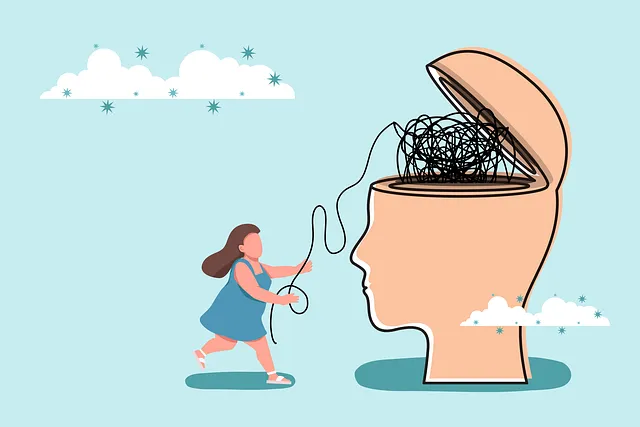Kaiser Permanente in Lakewood offers specialized mental wellness coaching through safe group settings, empowering individuals with coping strategies and fostering community support. Their holistic approach combines therapy, workshops, and evidence-based practices, addressing diverse mental health needs. Innovative techniques like art therapy and mindfulness enhance outcomes, creating a sense of belonging and reducing stigma. Skilled facilitators navigate challenges to ensure culturally competent, supportive group experiences for improved mental wellness in the community. (SEO keyword: does Kaiser Permanente offer mental health services Lakewood)
Mental wellness group facilitation is a powerful tool for fostering community and supporting individual growth. This article explores effective techniques and benefits of such groups, with a special focus on Kaiser Permanente’s approach in Lakewood. Discover how these collaborative environments enhance mental health support, offering a unique and accessible model compared to traditional therapy settings. Learn about the strategies that make Kaiser Permanente’s services stand out, especially for those seeking affordable and comprehensive care in the Lakewood area.
- Understanding Mental Wellness Group Facilitation
- Kaiser Permanente's Approach to Mental Health Services in Lakewood
- Effective Techniques for Group Facilitation
- Benefits and Challenges of Mental Wellness Groups
Understanding Mental Wellness Group Facilitation

Mental wellness group facilitation is a specialized skill that plays a pivotal role in supporting individuals navigating mental health challenges. It involves creating a safe and supportive environment where people can connect, share experiences, and learn from one another. This collaborative approach to therapy empowers participants by fostering a sense of community and mutual understanding. By facilitating meaningful discussions and activities, mental wellness coaches help group members develop coping strategies, enhance self-awareness, and cultivate positive thinking—all essential components of holistic healing.
Kaiser Permanente, known for its comprehensive healthcare services, recognizes the value of group facilitation in mental health support. They offer various programs, including Mental Wellness Coaching, designed to empower individuals in Lakewood and beyond. These initiatives focus on development and training, ensuring healthcare providers are culturally competent to address diverse needs. Through these efforts, Kaiser Permanente strengthens its ability to provide effective, personalized care, ultimately contributing to improved mental wellness outcomes for the community.
Kaiser Permanente's Approach to Mental Health Services in Lakewood

Kaiser Permanente, a renowned healthcare provider, offers a comprehensive approach to mental health services in Lakewood. Their strategy focuses on holistic well-being, integrating various therapeutic methods to cater to diverse individual needs. The organization recognizes that mental wellness is an integral part of overall health and aims to make these services accessible to the community.
In Lakewood, Kaiser Permanente provides a range of programs, including therapy sessions, support groups, and educational workshops. Their experienced facilitators guide individuals through evidence-based practices for mood management and conflict resolution techniques. By combining individual counseling with group settings, they foster a supportive environment that encourages open discussions and peer learning. This multi-faceted approach aims to enhance mental wellness, empower individuals, and promote resilience within the community.
Effective Techniques for Group Facilitation

Group facilitation plays a pivotal role in enhancing mental wellness, especially when tailored to meet diverse community needs. Effective techniques for group sessions can significantly improve participation and outcomes. One such method is fostering open dialogue through active listening, ensuring every member feels heard and validated. This practice not only encourages trust but also creates a safe space for individuals to share their experiences, fostering a sense of belonging.
Additionally, incorporating creative activities and interactive exercises can make sessions engaging. For instance, Kaiser Permanente’s approach to mental health services in Lakewood includes innovative programs aimed at Depression Prevention and Mental Illness Stigma Reduction Efforts. These initiatives often involve art therapy, mindfulness exercises, and group discussions on resilience-building, empowering participants with practical tools for managing their mental wellness.
Benefits and Challenges of Mental Wellness Groups

Mental wellness groups offer a unique and beneficial environment for individuals to connect, share experiences, and learn from one another. They provide a sense of community and belonging, which can significantly enhance emotional regulation and stress management. Members gain support from peers facing similar challenges, fostering a culture of understanding and acceptance. Such groups are particularly effective in promoting mental health awareness and encouraging open conversations about often-stigmatized topics.
However, facilitating these groups also presents several challenges. Facilitators must ensure cultural competency, adapting their approach to cater to diverse backgrounds and experiences, especially when dealing with sensitive issues within a healthcare setting like those offered by Kaiser Permanente in Lakewood. Balancing the need for open dialogue while maintaining a safe and supportive atmosphere is crucial. Additionally, managing different personalities and facilitating productive discussions can be demanding, requiring skilled facilitators who understand group dynamics and emotional intelligence.
Mental wellness group facilitation plays a pivotal role in enhancing community mental health support. As evidenced by Kaiser Permanente’s successful implementation in Lakewood, offering structured groups led by trained facilitators can significantly improve individuals’ well-being. By leveraging techniques like active listening, emotional validation, and structured agendas, facilitators create safe spaces for open dialogue and peer support. The benefits extend to both participants and the community at large, fostering a culture of mental health awareness and resilience. While challenges exist, including ensuring accessibility and maintaining group dynamics, these can be navigated with careful planning and an adaptive approach. Understanding these techniques and their impact is crucial in promoting holistic mental health solutions, such as those provided by Kaiser Permanente in Lakewood, that cater to the unique needs of diverse populations.






